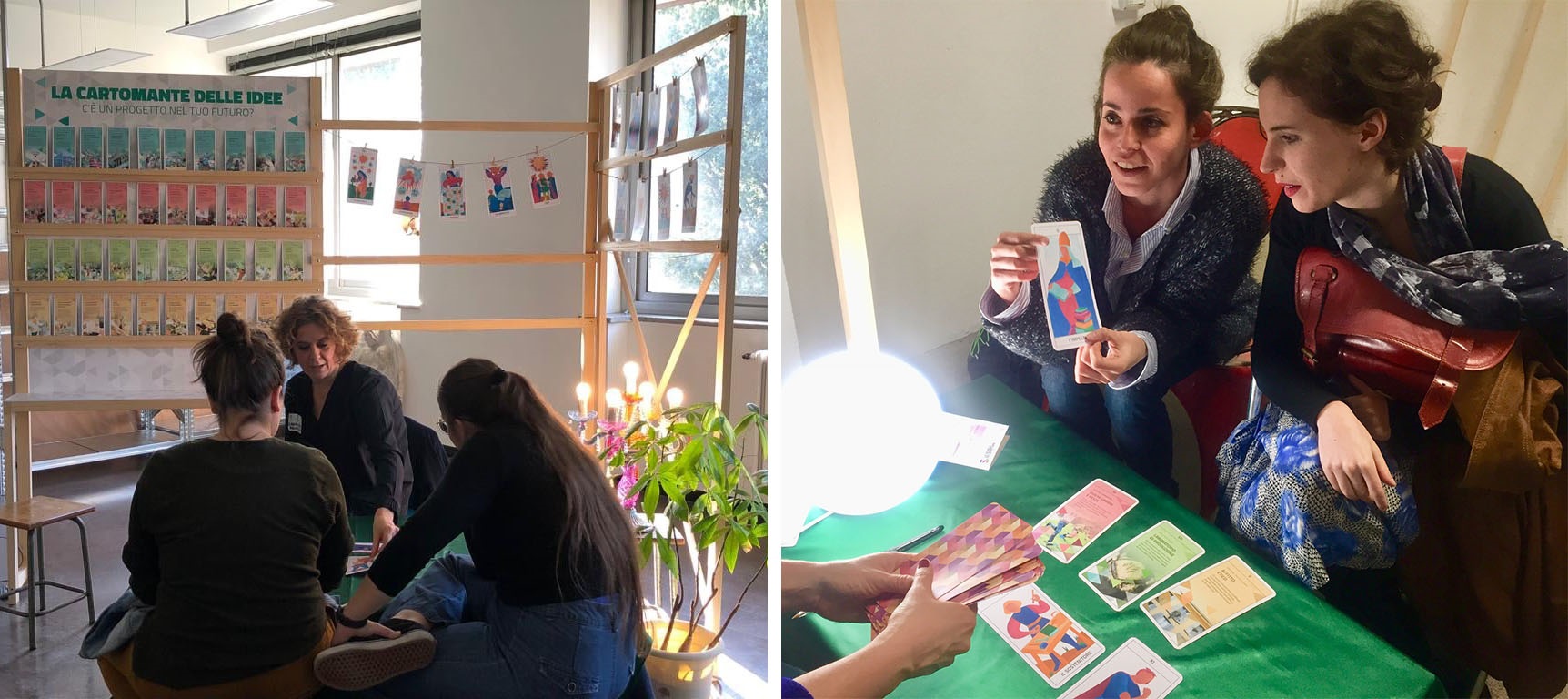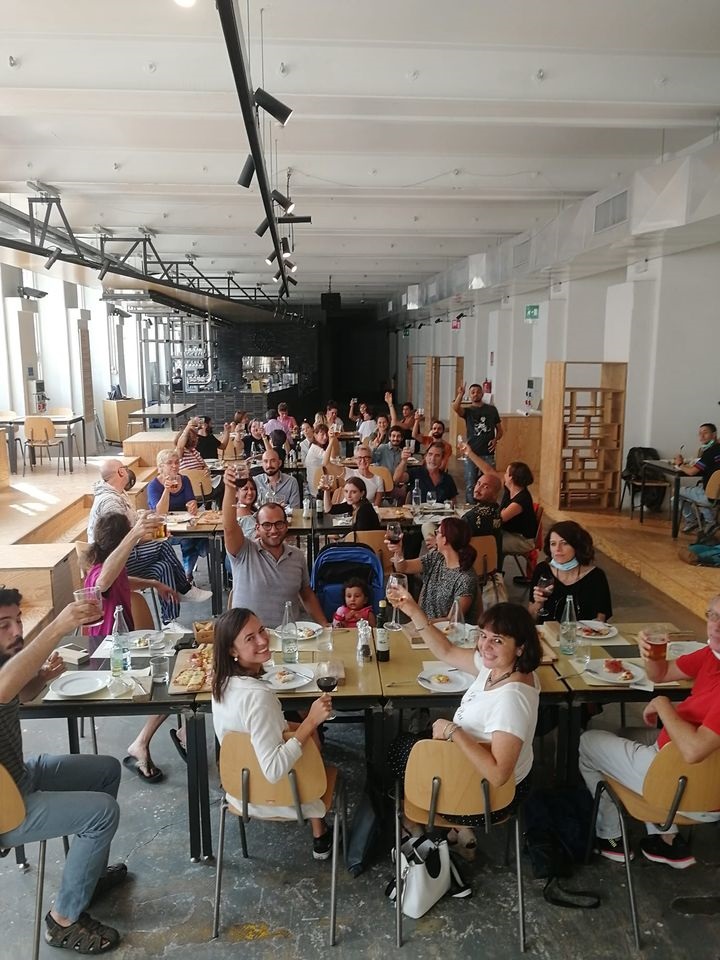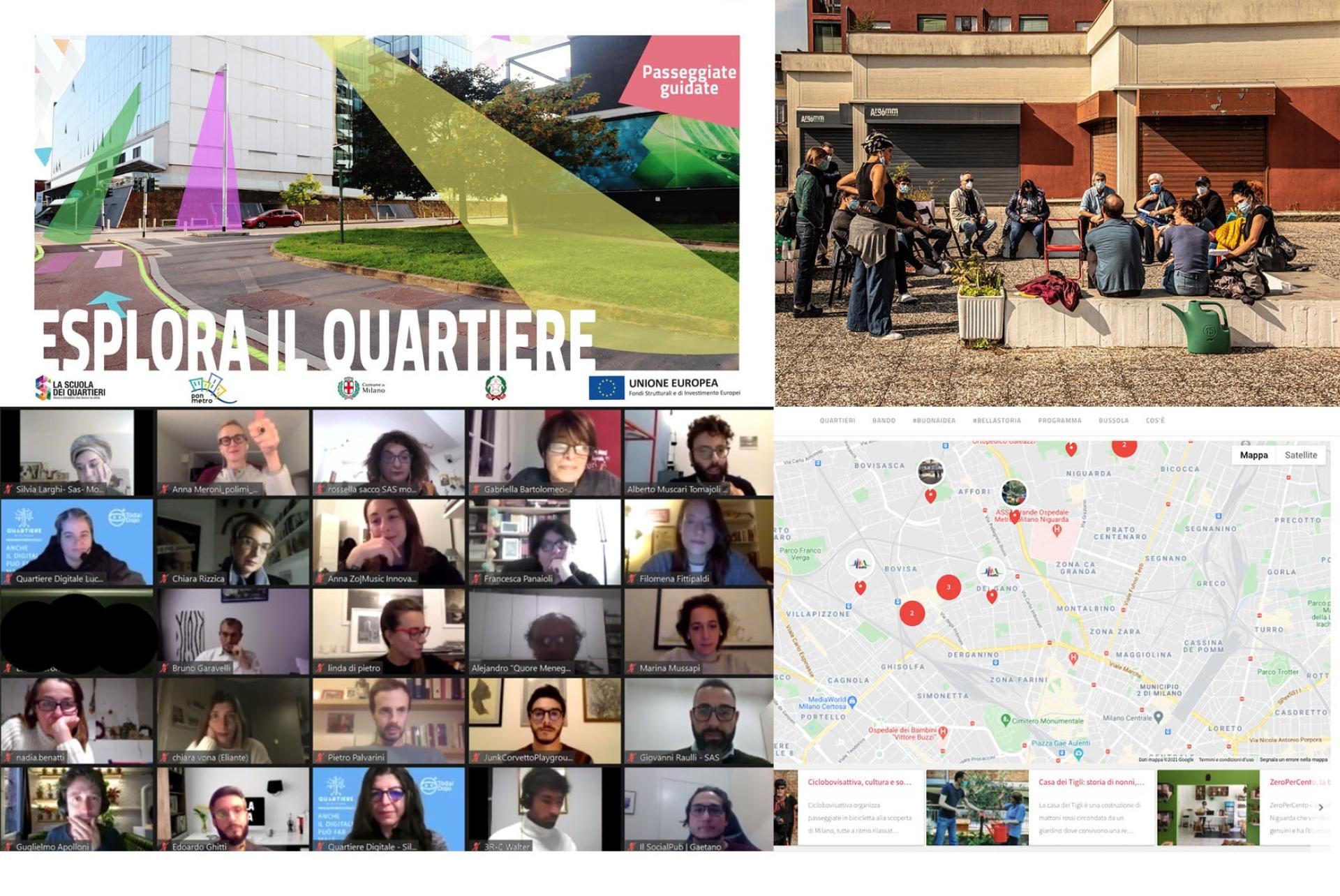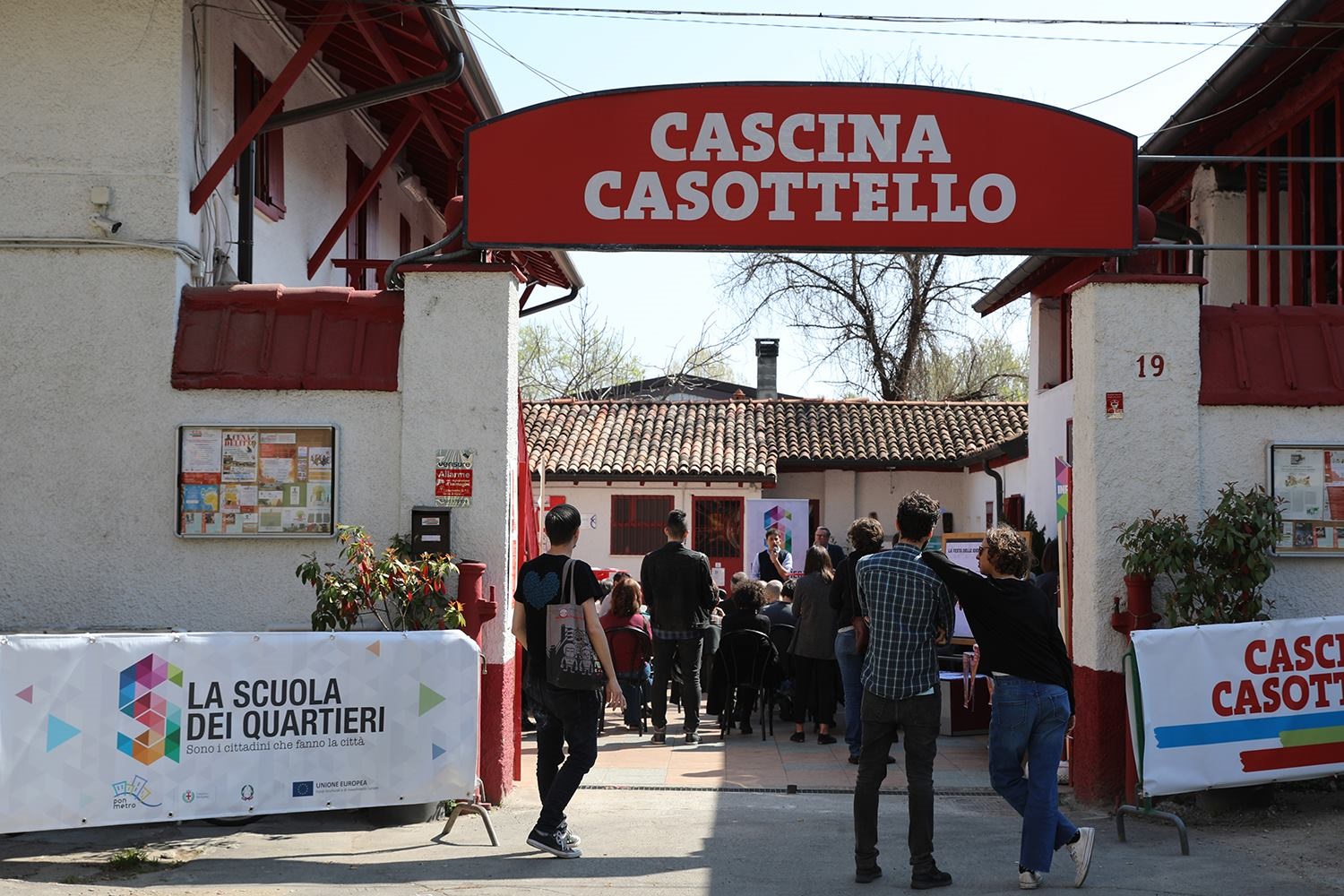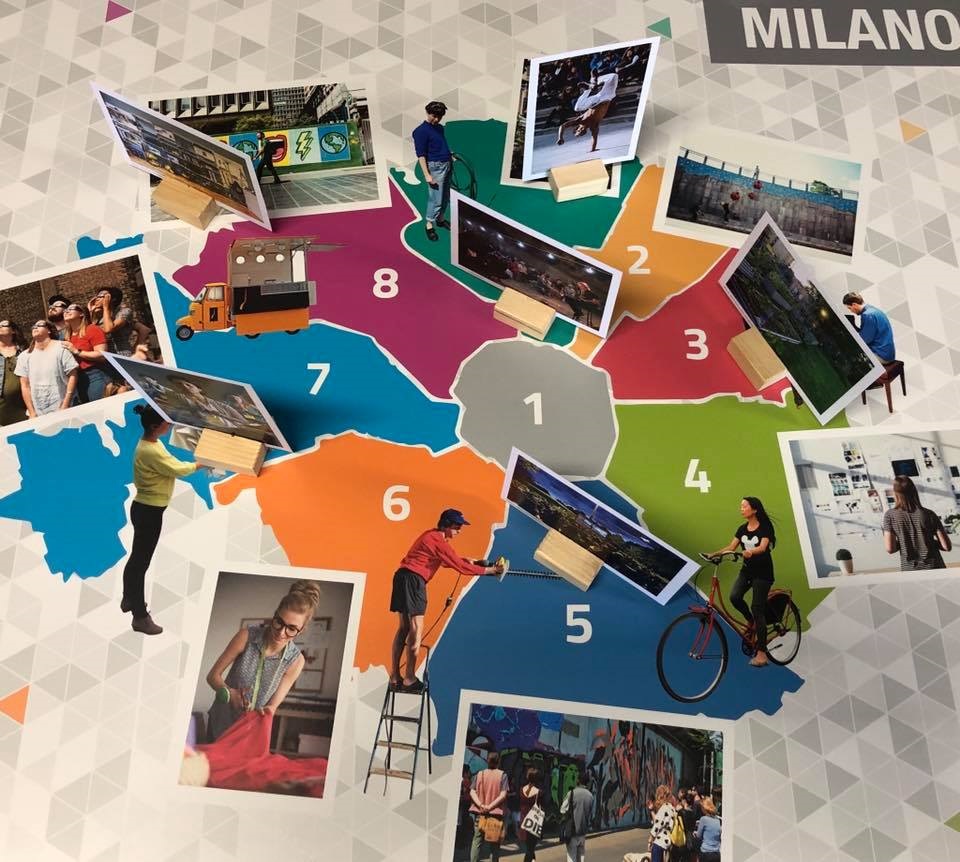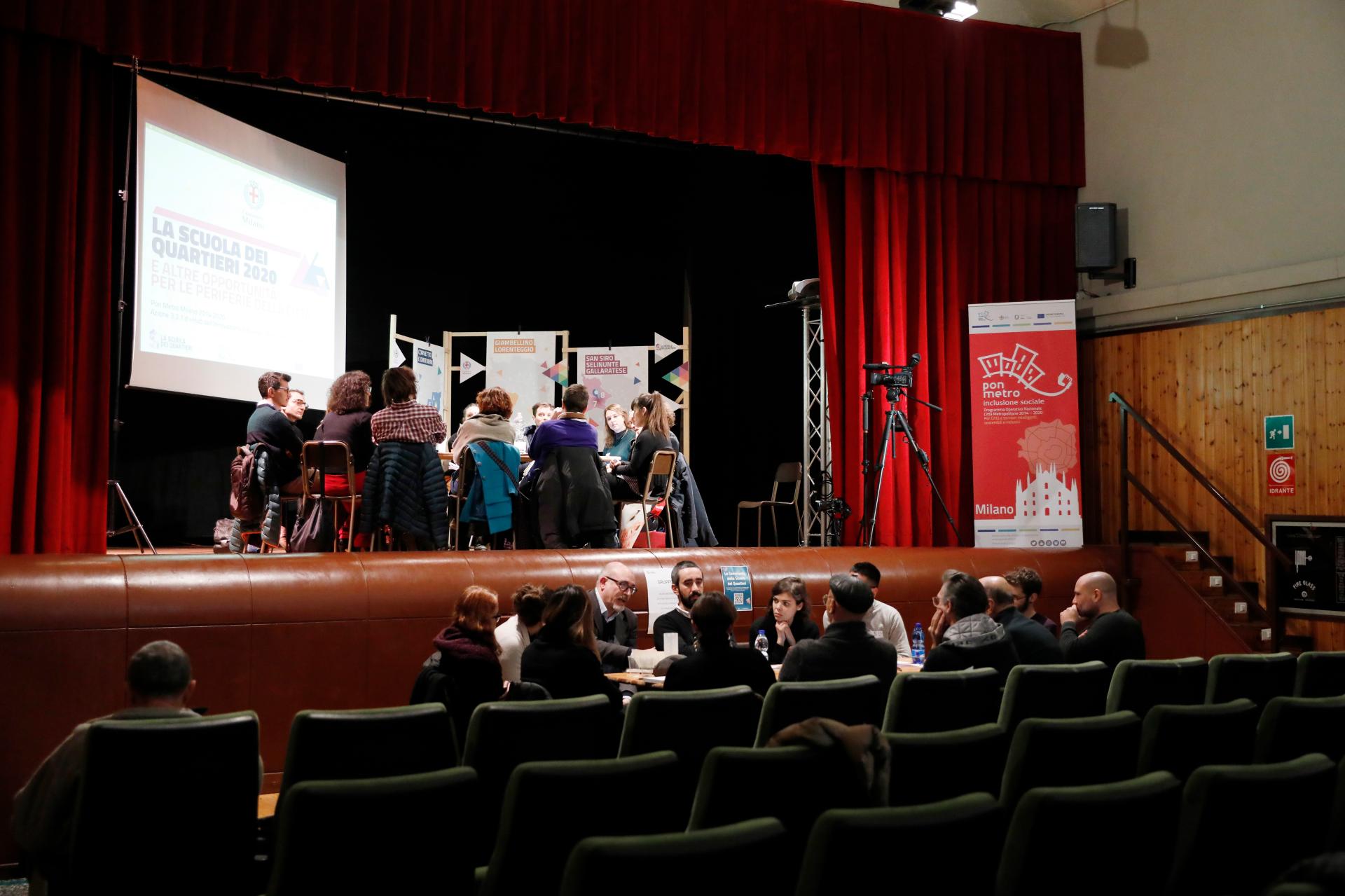La Scuola dei Quartieri (SdQ)
Basic information
Project Title
Full project title
Category
Project Description
The School of the Neighbourhoods (‘Scuola dei Quartieri -SdQ) is a free school of social innovation and entrepreneurship open to all citizens and spread throughout the city.
Conceived as a capability-building programme continuing the tradition of Milan's "civic schools", it contributes to the transformation of disadvantaged neighborhoods, spreading the ability and aptitudes of the inhabitants to design social impact solutions that respond to the needs of local communities.
Geographical Scope
Project Region
Urban or rural issues
Physical or other transformations
EU Programme or fund
Which funds
Description of the project
Summary
The School of Neighbourhoods (“La Scuola dei Quartieri”, from now on ‘The SdQ’) is a project promoted by the Municipality of Milan, which aims to create new activities and services, designed and implemented by citizens, to improve the life in the suburban areas.
Conceived as a capability-building multidisciplinary program open to all citizens and extended throughout the city, the SdQ continues the tradition of Milan's "civic schools" transmitting knowledge and practical tools to transform ideas, needs and desires into concrete, lasting and sustainable projects. The topics of intervention can be the most diverse such as: care activities, commercial and craft activities with a social impact, mutual aid projects, social gathering spaces, artistic and cultural promotion activities, circular economy and environmental protection, sports and well-being, training and education activities, etc.
Without classrooms, the SdQ takes place where people live and work (social spaces, public places, offices, backrooms, etc.). It is organised in cycles of scouting and incubation, each one of 3 phases:
- Public calls open to groups of minimum 2 citizens who are invited to submit innovative, useful and sustainable project ideas;
- Economic contributions, i.e. a grants up to € 25,000 aimed at supporting the first-year implementation of each selected ideas though the creation of new high impact non-profit organizations (association, social enterprise, etc);
- Training courses and customized supporting services throughout the whole project duration.
The SdQ is co-financed by the European Union under the National Operational Programme Metropolitan Cities 2014-2020, and it is implemented by a consortium of organizations specialized in the fields of social economy and innovation design. Information and materials, including a description of the winning projects, are available on the website: https://lascuoladeiquartieri.it.
Key objectives for sustainability
The SdQ is inspired by the tradition of the Milanese Civic Schools, which are educational institutions promoted by Milan Municipality with the aims of training people in sectors related to the craftmanship and the arts. They represent – we could say – the “Milan way” to the Bauhaus, a pragmatic approach to give people opportunities in the labour market, to be self-sufficient, strengthen self-expression skills and to participate in the social life of their community. “Civic schools” have historically played the role of supporting people’s adaptability and resilience in times of transition.
As dramatically emerged with the outbreak of COVID-19 pandemic, it was the time to widen the educational offer of the schools including social innovation. The SdQ – as an initiative that enables citizens and makes them promoters of social experiments in the city - is a policy tool for sustainability, because reduces dissipation (involving and not wasting social energies) and creates opportunity for a “circular economy of the collective intelligence”. In terms of first outputs, the SdQ trained the participants to a product service system design approach to innovation, in which behaviour change, eco-design and business model innovation are combined to achieve sustainability. In addition, a significant number of funded projects concern issues of environmental sustainability and circular economy. For ex., “Ibrida” and “Still life” give a second chance to unsold bread and blooming flowers; “ConservaMi” is an open source space to learn the ancient practice of repairing; “Zolle in comune” promotes the creation of a community garden; “Ortaja’ and “Seminare un cambiamento” are aimed at spreading sustainable practices in the field of nutrition, peri-urban agriculture and urban regeneration; “Riselda” has developed a 'waste-meter' that helps users to sort while earning money; “Ecoskate” combines the skateboard practices with the plastic recycling and reappropriation of urban spaces.
Key objectives for aesthetics and quality
The concept of SdQ developed along a process of different stages: the sketch of the seminal idea; the draft of the intervention model; the implementation of the first cycle used also as a testing stage; the partial re-formulation of the 3 previous phases in order to increase their effectiveness and the consolidation of the approach for its replicability and the production of the didactic materials such as “Seeing like a city”, the guide that participants were invited to use for doing their inquiries: data analysis, participant observation, surveys and interviews.
So, firstly the aesthetics aspect of SdQ is in the quality of the co-design process, that we have interpreted as an incremental process of trial and error, of learning through practice.
The genuine “Bauhausian legacy” for us is to use experimentation as a source of learning, to frame our initiative as a tool for collective inquiry and societal change.
In terms of outputs, SdQ developed a coordinated project of visual identity for each intervention in the neighbourhoods, so to increase a sense of recognition, belonging and active participation.
The co-design activities benefited from the design of micro-exhibition sets, and the digital and physical artefacts had the goal of generating high quality convivial experiences: the design of the scouting activities (i.e the “Ideas’ Festival”, the exhibition of the “Belle Storie” and the “Fortune Teller” card set), the educational formats (supported by edited video-pills and ad-hoc tools), the communication activities (such as the “Live from the Neighbourhoods” and the story-telling videos of the participating ideas).
Finally, the quality of the experience of SdQ initiative can be found in the design of the generated ideas, some of which aimed at changing the perception of public space in relation with its aesthetic function. For example, “Junk Corvetto Plyagroud” creatively assembles after-school activities with the regeneration of the neighborhood.
Key objectives for inclusion
The key challenge addressed by SdQ is how to combine innovation and inclusion in urban policies. As the Bauhaus was an effort to disseminate innovation at a large scale and make it available to all, in the same way for SdQ the social innovation is a practice that everyone can put in place and everyone can benefit from.
The SdQ relies on the people’s capacities to aspire (that is a future-oriented and imaginative capacity) calling for good ideas (a service, an initiative or even a social enterprise) that could improve the well-being of deprived communities, and provided support in terms of a financial grant, a networking activity and a training programme. Particularly ad hoc training formats have been designed to make the complexity of the design’s tools and means affordable to all participants.
We could say that the expected result was to build “learning communities”, in which no one is left behind and everyone can co-design social experiments that can be produce collective benefits. In terms of the outputs, the SdQ aimed at generating and supporting ideas that were sustainable in economic terms and generative of social impact.
Funded projects share a great capacity of including fragile contexts and vulnerable groups experimenting innovative solutions.
Here are few examples: “Milano Mediterranea” is a multicultural participatory art centre, where citizens – especially the Arabic-speaking background population - become active players in cultural programming and production; “Attitude records” is a record label that gives space to the emerging talents and teaches rap music to marginalized youth; “Molce Atelier’ is a therapeutic tailoring shop run by women victims of violence, with the aim of promoting their autonomy and self-sufficiency through the learning of a profession; "NaturalMente: lo psicologo al parco" (Naturally: the psychologist in the park) meets the needs of adolescents providing an outdoor multicultural psychological support service.
Results in relation to category
SdQ project acted as an open and diffused educational initiative in the suburbs. Its outcomes comprise all the activities in each stage of the School (scouting, training and prototyping) since they are intentionally designed to transfer both cultural and technical skills necessary to the conception, codesign and production of collaborative solutions.The key figures of the achievements obtained during the three-year period 2019-2021:
- 70 public events realized on site in the neighborhoods and on-line (after the pandemic outbreak) with 2,300 people attending;
- 3 Calls for proposals addressed to 4 different suburban areas;
- 193 projects ideas submitted in response of the above mentioned Call for proposals (respectively, 49-59-85 in the context of the 1st, 2nd and 3rd Calls); 210 people involved in advanced training;
- 1 million euros of public (European Social Funds) grants;
- 40 projects funded and as well as many new nonprofit organizations built;
- 61% of female participation, 41 of youth participation.
From the 1st to the 3rd cycle of the SdQ, the number of submitted ideas increased almost 3-fold, reflecting the overall capacity to attract and support the generation of ideas, making people familiar with the surrounding ecosystem and not afraid to experiment and participate.
The interdisciplinary training accelerated the transition of the ideas from initial concepts to a prototyping stage, and of the participants from informal groups to established nonprofit organizations. Finally, coming to the prototyping phase, a personalized support along the whole duration of the project allowed each solution to realize the experimentation, involving the neighborhood in a process of testing and often co-production of the activities. The connections with the context emerged to be crucial not only for future scaling the ideas but also in networking the social innovators with the neighborhoods and in grounding solutions to the actual needs and assets of its community.
How Citizens benefit
The payoff of the SdQ is "citizens make the city”. This means that the community involvement process has been designed according to a codesign and co-creation approach. The SdQ has not been a “traditional” participatory project, in which a local authority tries to involve citizens, because their knowledge resources can improve the quality of the public policies. The SdQ has given the people the opportunity to express their energies, creativity and resourcefulness and designed a capacity building program to make this opportunity realistic. The SdQ has been an attempt to make education a key element of an urban regeneration policy. This is the most relevant way to interpret it and to frame its social impact, and even the most valuable message for the New European Bauhaus. Over a period of 3 years, 70 meetings were held in the neighbourhoods: presentations, exploratory walks, public imagination workshops, ideas festivals, open lectures, codesign workshops, actively involving 2,300 people in the neighbourhoods. Communication and storytelling actions in the shape of social media campaigns and groups (the SdQ online Community), radio formats and online live broadcasting proposed during the pandemic have reached the entire city, increasing the impact and contributing to attract Milanese people to the neighbourhoods. A specific set of initiatives were dedicated to the growth of a SdQ supporters’ community. With the aim of being grounded in the suburban areas, the SdQ mapped and involved local stakeholders (e.g: associations, shops, cultural centres, small businesses, schools, informal initiatives) as well as mentors with the aim of enhancing the existing relationships, increase the collaborative potential and provide a supportive context to the project ideas. Moreover, aiming at scouting and sustaining inclusive, socially innovative and sustainable projects, the selected ideas themselves have had an impact on the involvement of citizens in their services and initiatives.
Physical or other transformations
Innovative character
In recent years there have been many initiatives that have combined public and social innovation practices. Most of them have detected existing social practices, identified their innovative characters and addressed the challenge to enable and scale them up.
The SdQ has chosen a different perspective introducing innovative elements. The 1st one is related to the beneficiaries. In Milan there is a significant amount of initiatives (promoted by banks and enterprise foundations, P.A., etc.) that support not-for-profit organisations in their community development projects. The SdQ instead has identified a new target group, composed by informal groups of citizens which could have fruitful ideas for social projects in deprived areas, but were not considered by the more traditional supporting programmes. The aim of the SdQ is to select proposals at a very early stage and to help them in moving their first steps.
A 2nd innovative element relies on providing project ideas with 3 kinds of supports: a grant, a capacity building program together with customized supporting services and a network of mentors and supporters composed by community organizations within the neighbourhoods. The training and supporting services are aimed at supporting the operational start-up of the project itself, identifying clients, customers and activating collaborations, defining and implementing communication and marketing strategies, exploring the potential of digital tools and technologies, monitoring the activity and improving the capacity for economic and financial planning and management, facilitating access to credit and other types of financial resources.
A 3rd innovative element consists in giving the participants the chance to experiment, prototype and even fail with their ideas.
A last element of innovation is the use of education as a tool for urban regeneration policy. In our view, the regeneration of deprived areas is a matter of increasing basic capabilities of the people.
Learning transferred to other parties
The SdQ is a policy initiative deeply rooted in the context of Milan. Its design relies on the specific characteristics of the target suburbs and of the urban ‘milieu’ in general, such as the risk of having a "two-speed city" with a gap between the center and the periphery, and therefore the need of a strategy for inclusive social innovation. Nevertheless, the SdQ has a high potential for transferability to other cities and contexts.
Thanks to the 3 cycles of activities carried on along the years 2019-2021, the initiative has reached a level of maturity that allows to take stock of the experience so far, and share results and lessons learnt.The experience gained so far will be capitalized within the SdQ 2022 edition recently launched (march 2022) and financed by the European resources for the post-pandemic recovery (REACT-EU package).
A strong evidence of the ability of SdQ to adapt itself and contribute to the adaptation strategy of the city has emerged during the COVID-19 pandemic. Thanks to a digital transition and to a more comprehensive transformation of its strategic design, the activities have continued without interruptions, playing an important role in providing resilient ideas and solutions to emerging needs.
There has been a growing interest in the SdQ at local and national level. The cities of Bologna and Napoli have already drawn inspiration from the SdQ for the development of their local social innovation programs. Several awards have been received. In 2019 it was considered the best urban regeneration project in the context of CRESCO AWARD Sustainable Cities, promoted by Sodalitas Foundation (https://www.sodalitas.it/conoscere/news/cresco-award-i-comuni-vincitori-della-4-edizione). In 2020, the SdQ was finalist in the context of The Innovation in Politics Awards (Democracy Category: https://innovationinpolitics.eu/showroom/project/the-school-of-the-suburbs-citizens-make-the-city/).

